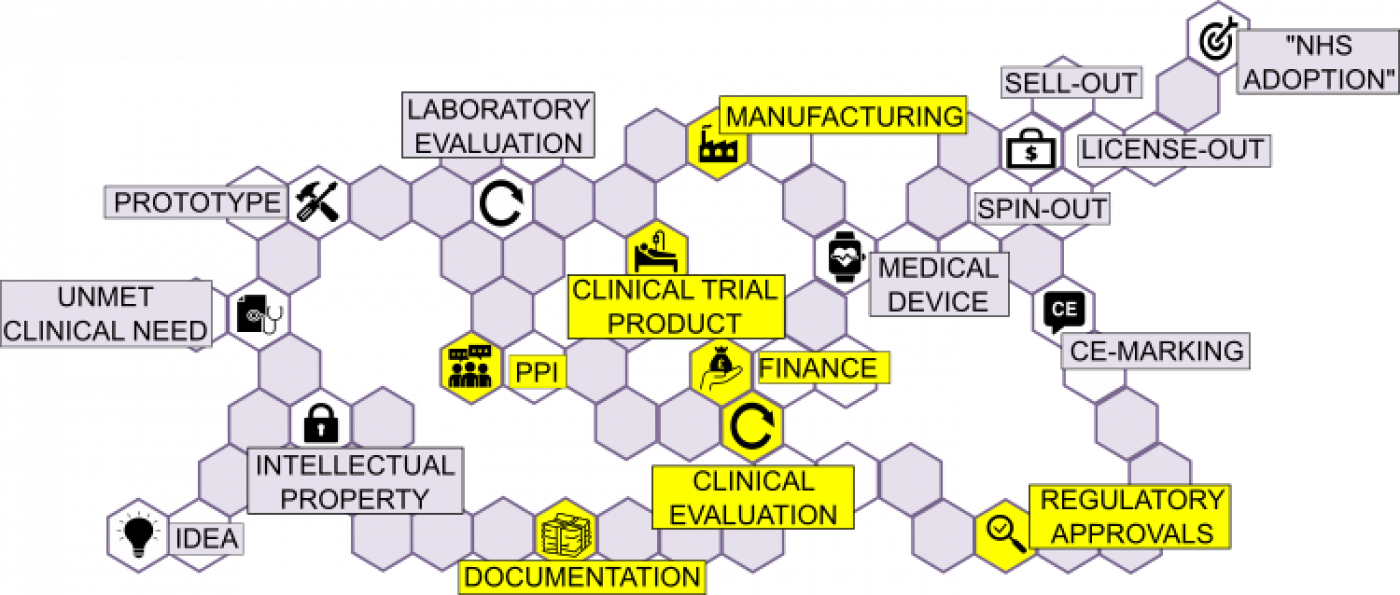Medical device manufacturers must conduct clinical evaluation to compare a new device to standard of care practice. This section includes considerations needed here for market approval and adoption.

 STUDY DESIGN/PATIENT & PUBLIC INVOLVEMENT (PPI)
STUDY DESIGN/PATIENT & PUBLIC INVOLVEMENT (PPI)
Medical device manufacturers are required to conduct clinical evaluation (incl. literature review, trials) to compare a new device to standard of care practice, or established similar devices, for (pre-)market approval and adoption
- Undertake risk-benefit assessment of the new device under actual clinical conditions of use
- ISO 14155 Clinical Investigation of Medical Devices for Human Subjects - Good clinical practice. An international standard for studies carried out in human subjects to assess the safety and performance of medical devices for regulatory purposes
There’s also a great guidance document from the International Medical Device Regulators Forum (IMDRF) that would be useful to include: http://www.imdrf.org/docs/imdrf/final/technical/imdrf-tech-170921-samd-n41-clinical-evaluation_1.pdf
Important PPI considerations:
- Understanding the patient and clinician needs – Does your TPP meet all of the essential requirements expressed by frontline clinical care providers, patient and public contributors (PPI)?
- Research is carried out ‘with’ or ‘by’ members of the public or potential patients etc. – Advisory members of a project steering group
Further information on PPI can be found via INVOLVE: www.invo.org.uk/
UCL Support:
The UCL Translational Research Office (TRO) can help with the timely identification of future needs or opportunities for diversifying, as well as advising on appropriate patient groups and charities to consider.
 DOCUMENTATION:
DOCUMENTATION:
Although resource-intensive from the start, the development of a comprehensive Device master file unquestionably increases commercial attractiveness and value of a product to a potential buyer, since it avoids the need to ‘back-fill’ the history and results of the Device design, manufacture & testing.
 FINANCE:
FINANCE:
Regardless of altruistic drivers, clinical evaluation of devices has significant costs that must be met.
UCL Support:
The Translational Research Office (TRO) supports UCL device developers in attracting and managing public, commercial, investor and philanthropic funding for clinical studies of devices, appropriately costed in partnership with the JRO.
 REGULATORY APPROVALS:
REGULATORY APPROVALS:
Medical device developers require local, national & international approvals for device evaluations in hospital(s) and must engage with regulators in advance to identify and address potential hurdles to authorisations.
UCL Support:
The Joint Research Office (JRO) and Translational Research Office (TRO) support device developers in the above points, as well as ensuring rigorous compliance of UCL researchers and contractors with international standards.
 Close
Close

